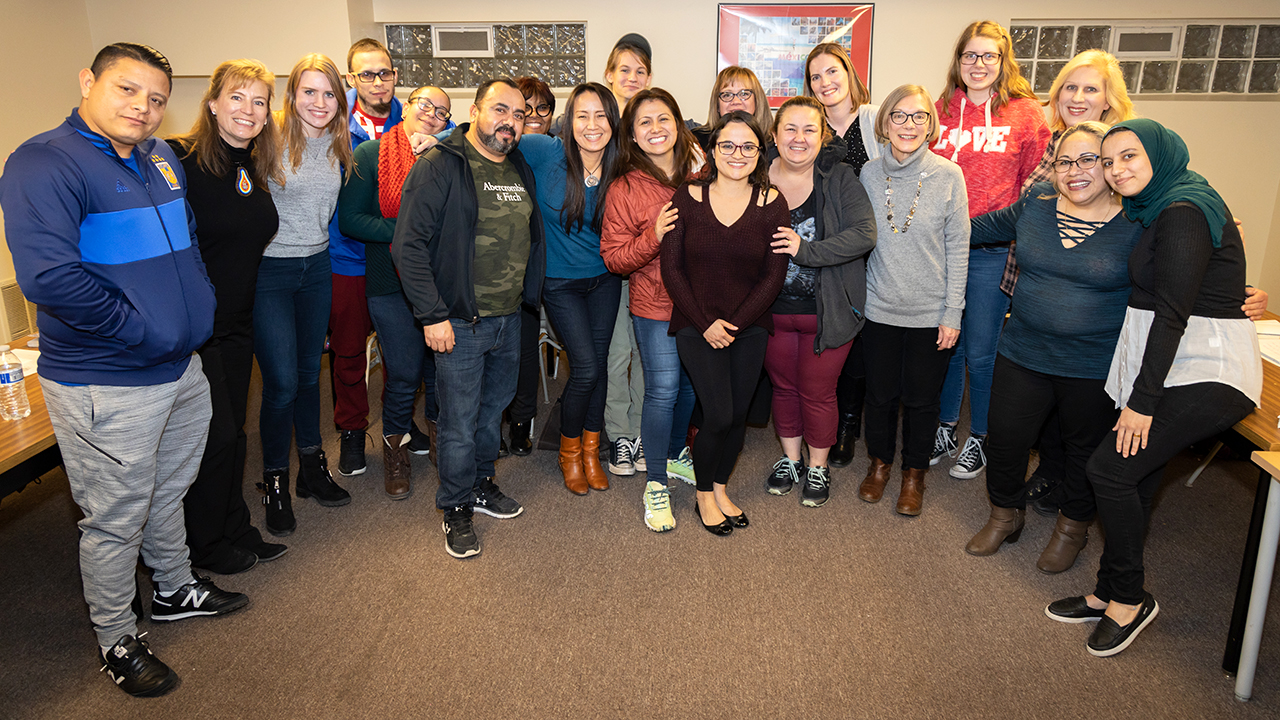- YouTube
- TikTok
Community outreach program pairs OU students with non-native speakers of English

For more than 20 years, the Linguistics Department at Oakland University, in cooperation with Hispanic Outreach Services in Pontiac, has offered an adult English as a Second Language (ESL) community outreach program taught by OU student teachers completing either a minor in Teaching English as a Second Language (TESL) or a graduate certificate in TESL. These TESL programs provide free English language classes to non-native speakers of English.
As part of the program, the OU undergraduate and graduate students completing their student teaching Practicum (ALS 4960/5960) assist faculty Angela Super in organizing a Conversation Partner event once or twice each fall and winter term. Volunteers from the OU community and surrounding communities volunteer to participate in this Conversation Partner event. The OU ESL student teachers and volunteers are paired with participants in a setting similar to “speed dating,” with new pairings happening every 10 minutes or so.
A recent session, held March 4-5 at La Casa Amiga in Pontiac, attracted 46 participants — including 23 volunteers and 23 ESL students.
“Inside the circle we had volunteers speaking English, and outside the circle we had people who were there to learn English,” said Kuniko Nielsen, associate professor and chair of the Linguistics Department at OU.
“It’s an incredible opportunity for our OU community,” Nielsen said. “I think they (OU students) get more out of this than the language learners. They get to hear about the life stories of these people who are just trying to make a living in a foreign country, and it helps them realize that immigrants are real people with real jobs and real lives.”
Nielsen knows firsthand about the reality of being an immigrant in America — she emigrated from Japan to the United States in the fall of 1996 in order to pursue a degree at Ohio State University.
“It was hard; it was very hard,” she said. “In fact, I avoided talking to people because it was so hard. Looking back, I wish I had been a bit more outgoing early on. The people I met at the conversation exchange at Hispanic Outreach Services in Pontiac were doing exactly what I wish I had done. Going out of their comfort zone and forcing themselves to meet and talk to many English speakers. I admire all of them and want to do what I can do to help them.”
The ESL community outreach program is an initiative of the Department of Linguistics and is supported by the College of Arts and Sciences and administered in cooperation with Catholic Social Services of Pontiac. Graduate and undergraduate student teachers completing their degree requirements for TESL certification teach the classes under the guidance of a faculty supervisor.
“It’s a great activity for the ESL students to practice conversation with fluent English speakers,” said Angela Super, a special lecturer in the Linguistics Department. “In addition, the English-speaking participants benefit from interacting with new immigrants and understanding their struggles as they adapt to this community. It is a reminder to all of us that many of our ancestors experienced these same struggles as well.”
Rebecca Gaydos, special instructor and TESL coordinator at OU, said that many of the OU students who participate in the minor in Teaching English as a Second Language (TESL) or a graduate certificate in TESL programs go on to teach ESL at the national and international level.
“They teach overseas, as well as here in the United States,” she said. “It just depends on what they want to do. Many of our graduate students go on to get teaching jobs in TESL at universities, while our undergraduates seem to want to go overseas to places like Asia and Europe.”
Nielsen said she’s hopeful that the program will provide all participants with a better understanding of Linguistics and cultural diversity.
“I think it’s so important to meet people, especially immigrants, because we all have these biases, which are not grounded in any way,” she said. “This is a real opportunity to meet people – really meet them — and get rid of some of those biases and stereotypes you might have about immigrants. I think it’s important that OU students are exposed to that information.”
For more information about the program, visit oakland.edu/linguistics/tesl-outreach-programs.


 March 18, 2020
March 18, 2020